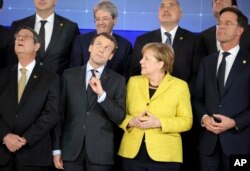Making no secret of her desire to move on with Brexit talks, British Prime Minister Theresa May won applause from EU leaders Thursday for efforts so far in agreeing to an outline of divorce terms.
A day after she suffered a defeat in parliament in London over her blueprint for quitting the European Union, May told her peers over dinner in Brussels that she was on course to deliver Brexit.
Offering her reassurance that they would formally endorse on Friday the launch of a second phase of negotiations on a free-trade pact and an initial transition period to it, leaders responded to May's remarks by clapping and congratulating her.
She told them that her priority was agreeing on a transition period after Britain leaves in March 2019 to offer businesses certainty. And she again urged the other 27 nations to speed up the talks to unravel more than 40 years of union and open discussion of trade relations, which she sees as crucial for a smooth exit.
A British government official said the prime minister made "no secret of wanting to move on to the next phase and to approach it with ambition and creativity."
"I believe this is in the best interests of the UK and the European Union," she told the EU leaders. "A particular priority should be agreement on the implementation period so we can bring greater certainty to businesses in the UK and across the 27."
Congratulations from Merkel
Officials said German Chancellor Angela Merkel congratulated May on bringing the negotiations last week to the stage of "sufficient progress" that will enable leaders to accept opening the next phase of talks.
May got applause and congratulations from leaders around the table because she will not be present when they take the decision to start talks on a transition period and a future trade deal late on Friday morning.
The chairman of EU leaders, Donald Tusk, will update May on Friday on the results of the leaders' talks on Brexit in a phone call, officials said.
May, weakened after losing her Conservative Party's majority in a June election, has so far carried her divided government and party with her as she negotiated the first phase of talks on how much Britain should pay to leave the EU, the border with Ireland and the status of EU citizens in Britain.
But the second, more decisive phase of the negotiations will further test her authority by exposing the deep rifts among her top team of ministers over what Britain should become after Brexit.
Acknowledging the tough talks ahead, Tusk said that only the unity displayed so far would deliver a good deal as discussions moved to trade — an issue on which the member states have different interests.
"I have no doubt that the real test of our unity will be the second phase of Brexit talks," Tusk told reporters.
May's team was upbeat.
"Look at what's been achieved so far. The deal on phase one, which many commentators said couldn't be done, has been done," the British government official said.
"Look at the language from the other European leaders today. ... All the signals from them are that they are looking forward to continuing to negotiate with the prime minister."
Hurdles
The EU is willing to start talks next month on a roughly two-year transition period to ease Britain out after March 2019 but wants more detail from London on what it wants before it will open trade negotiations next March.
The deal almost fell apart last week when May's Northern Irish allies rejected an initial agreement for fear that a promise to protect a free border with EU member Ireland could separate the region from the rest of the UK.
After days of often fraught diplomacy, May rescued the deal to meet the EU's requirements for "sufficient progress," but the last-minute wobble by the Democratic Unionist Party, which she depends on in Parliament to get laws passed, and the defeat in Parliament on Wednesday underlined the struggles she faces.
"I'm disappointed with the amendment," she told reporters as she arrived at the summit. "But the EU withdrawal bill is making good progress through the House of Commons and we're on course to deliver on Brexit."
May's success so far has won her some respite at home from political infighting between enthusiasts and skeptics of Brexit in her ruling party, and has reduced the prospect of a disorderly departure from the bloc.
At the summit, she was again keen to show that Britain was an active member of the bloc, committing to staying in the Erasmus student exchange program until the end of 2020 and taking part in discussions on the bloc's plan for closer defense cooperation.
Over dinner, leaders were also discussing responses to the migration crisis from Africa and the Middle East, and lingering deep divisions over how to share the load.
They confirmed a rollover of sanctions on Russia over the Ukraine crisis and reaffirmed their opposition to U.S. President Donald Trump's move to recognize Jerusalem as the capital of Israel.






